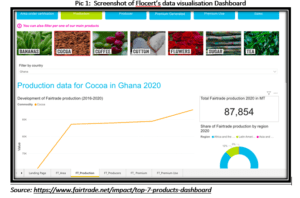Are they really improving the livelihoods and net income of cocoa farmers?

Fairtrade’s claims of improving the livelihoods and net income of cocoa farmers have been put under scrutiny. With only 8% of Fairtrade-produced cocoa beans sold on Fairtrade terms, it begs the question: How is Fairtrade improving the net income of Fairtrade cocoa farmers?
When asked for evidence of the net income increase of Fairtrade cocoa farmers, Fairtrade responded with examples of its living income work in Cote d’Ivoire and feedback received from annual producer surveys and engagements. They also highlighted some of their recent cash payouts to producer organisations in Ghana. However, it is concerning that Fairtrade cannot provide factual data and evidence to substantiate its claims.
In contrast, when KOA was interviewed, they were able to provide concrete examples of how their business model directly benefits cocoa farmers, such as funding the picking of cocoa beans for the cocoa pulp extraction and saving farmers money they would have spent in conveying their beans.
It begs the question, is Fairtrade more focused on satisfying ESG scores of multinational chocolate companies in the west rather than making a substantial impact on the net income of Fairtrade farmers? Is Fairtrade facilitating business-biased sustainability objectives of western firms to please ethical buyers of chocolate in the west? Fairtrade pointed to a pilot project on a cocoa cooperative for a “living income premium” as evidence of their impact. However, a pilot project is not sufficient evidence to demonstrate the impact they have had on the net income of Fairtrade farmers over their 20 years in Ghana.
It is time for Fairtrade to provide factual data and evidence to substantiate their claims of improving the livelihoods and net income of Fairtrade cocoa farmers. I asked Fairtrade to provide me with historical records of the fees they charge producing organisations (cooperatives) that join their label and how it has changed over time since their 20 years in Ghana. Fairtrade pointed me to their cost calculator to find out, so I asked if they could confirm that these fees, as shown in the calculator/email, have remained the same since the inception of Fairtrade. This was why I requested annual records to monitor the fees’ changes.
Fairtrade responded that:
“About Fairtrade certification
Almost 20 years ago, FLOCERT developed the independent certification system which is the basis for the credibility of Fairtrade. To ensure this independence, FLOCERT is a separate entity. Being a part of the Fairtrade family, FLOCERT is a mission-driven social business that aims to preserve the high credibility of Fairtrade and provide the resources needed to continuously improve its services and systems. FLOCERT’s accreditation as a “Social Enterprise” further demonstrates its commitment to social business values.
In line with Fairtrade’s mission of supporting and empowering producers, FLOCERT’s certification fee structure aims to enable producer organizations to participate in Fairtrade regardless of their location, size, etc. The typical fees for producers are lower than comparable certification schemes. This is enabled by proportionally higher fees for regular traders, which are utilized to cross-subsidize costs of certification for producers and smaller traders.
FLOCERT applies an “all-in”-fee model for traders and producers. There are no hidden costs, meaning no extra charges for audits, travel, or customer attendance. The fee is not based on the turnover of Fairtrade products because Fairtrade sales should not be disincentivized and negatively affect certified customers. This principle also helps preserve FLOCERT’s impartiality, as all similar customers follow the same fee structure, regardless of their size or their Fairtrade sales.
When applying for Fairtrade certification, FLOCERT charges an application fee of 565 EUR to any customer. On top of the application fee, a customer pays an annual fee. In the first year of certification, this fee starts at 1,545 EUR for the smallest possible small producer organization (SPO, below 50 members) and 2,940 EUR EUR for traders. This sum covers all costs, including the audit, for the first twelve months. The annual fee is lower in subsequent years, if the customer can be classified into a lower fee category, something that FLOCERT will be able to determine after the first audit.
Information on the estimated individual certification fee is available on FLOCERT’s website: https://www.flocert.net/solutions/fairtrade-resources/cost-calculator/
These are some examples of typical annual certification fees:
- Small SPO (< 50 members): 1,260 EUR
- Average SPO (~ 260 members [1]): 2,120 EUR
- Large SPO (> 500 members): 2,595 EUR
- Trader, importing 2 products from country of origin:3,280 EUR
- Trader, manufacturer of a composite product: 2,940 EUR
- Trader, Licensee below 2 mio. EUR global turnover: 270 EUR”
It is concerning that Fairtrade did not provide the requested historical data and instead only provided data from 2015 to 2019. While Fairtrade stated that they worked through consultants in Ghana from 1995 to 2012, it is unclear why this would prevent them from accessing the data that they commissioned and paid for. The fact that Fairtrade is referring to Flocert, their audit organisation, for data on Fairtrade is also questionable. Typically, one would expect to receive information directly from the organisation rather than their auditors. This raises questions about transparency and accountability within Fairtrade. It is important for Fairtrade to provide a clear explanation for why they did not provide the requested historical data and to take steps to ensure that they are more transparent in the future.
I emailed Flocert with a request for the data below:
- Annual quantity of Fairtrade Cocoa beans produced in Ghana since Fairtrade’s operation in Ghana till date? (I will be happy if this data is presented in a table form to make clear each year and its respective production)
- The annual Fairtrade Minimum price for cocoa beans from fairtrade’s inception till the date (I will be happy if this data is presented in a table form to make clear each year and its respective values)
- The annual Fairtrade premium per metric of cocoa beans paid to Ghanaian cocoa farmers from Fairtrade inception till date (I will be happy if this data is presented in a table form to make clear each year and its respective values)
- What percentage of the Fairtrade Premium was sent to the Ghana Cocoa Farmer per metric ton of cocoa, what percentage was retained for Fairtrade operations, etc since Fairtrade’s inception to date? (I will be happy if this data is presented in a table form to make clear each year and its respective values)
- – How many Cocoa Farmers and Cooperatives produced Fairtrade cocoa beans annually from Fairtrade’s inception to date (I will be happy if this data is presented in a table form to make clear each year and its respective production)
- What has been the Net income increase of Fairtrade cocoa farmers since fairtrade’s inception to date? The assumption is that Fairtrade is providing a net benefit in terms of income to its certified farmer as compared to conventional cocoa farmers. (I will be happy if this data is presented in a table form to make clear each year and its respective values)
- What is the value of Fairtrade as a brand, hence the reason for which cocoa processors and chocolate manufacturers are willing to subscribe to it?(I will be happy if this data is presented in a table form to make clear each year and its respective values)
I received this response from Flocert:
|
|
Apr 1, 2022, 2:07 PM |
“Dear Kwame,
Thank you very much for your interest in FLOCERT and the Fairtrade movement!
We are very pleased to hear of your research project plans discussing Fairtrade certification. Due to limited time and resources, we are unfortunately not able to supply individual data requests.
We encourage you to look at Fairtrade International’s dashboard, where you can find relevant and up to date information about impact, standards, products and much more: https://www.fairtrade.net/impact/top-7-products-dashboard.
We would also suggest that you reach out to Fairtrade International via their academic request form to see if they can supply any further data: https://www.fairtrade.net/contact.
Thank you very much for your understanding.
Best regards,
FLOCERT Customer Service Team”
In response to my request for data, Flocert informed me that they are unable to supply individual data requests due to limited time and resources. Instead, they directed me to Fairtrade International’s online dashboard. However, the dashboard (Shown in Pic 1 )only provides data from 2016 to 2020, which does not cover the period I requested (1995 to the present). As a stakeholder in the cocoa sector, I find it concerning that Fairtrade and Flocert refuse to provide necessary data, especially given their self-proclaimed role as auditors of ETHICS, FAIRNESS, and SUSTAINABILITY within the cocoa sector. All data within the system of Flocert belongs to smallholder Fairtrade farmers and their respective household members and stakeholders, and it is unacceptable to withhold this information from those who rely on it. As a cocoa farmer’s son, I expected to receive some leniency, but this was not the case. I cannot help but wonder if the fact that I am a Black African requesting information from a predominantly white-led organisation played a role in their decision to reject my request. It is unacceptable that Fairtrade and Flocert can refuse to provide information to producing countries and their stakeholders, especially when smallholder farmers cultivate cocoa farms. The claim that Flocert lacks the “resources” to provide data upon request raises questions about whom they truly serve.
Pic 1: Screenshot of Flocert’s data visualisation Dashboard
Source: https://www.fairtrade.net/impact/top-7-products-dashboard
To continue reading, subscribe to https://cocoadiaries.substack.com/subscribe










